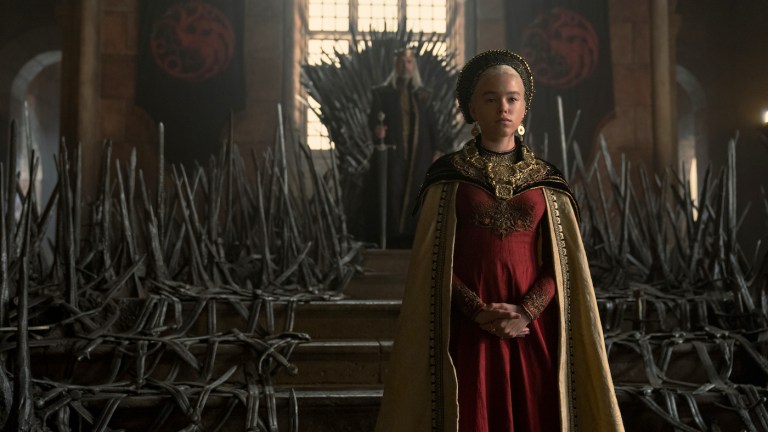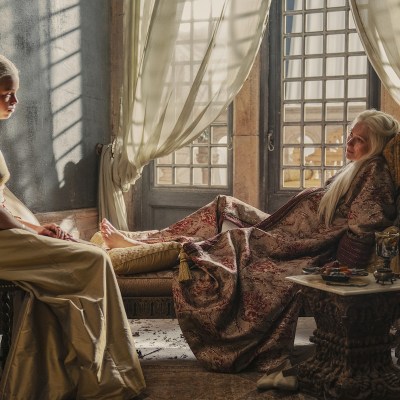Matt Smith and Milly Alcock on Daemon and Rhaenyra’s Ambiguous Relationship in House of the Dragon
House of the Dragon stars Matt Smith and Milly Alcock discuss the implications of Prince Daemon and Rhaenyra Targaryen’s first scene.

This article contains House of the Dragon episode 1 spoilers.
One episode into House of the Dragon, and it’s clear the series is going to return to the ambiguity that made Game of Thrones so compelling—and at times more than a tad disturbing. Take for instance the first big scene between Matt Smith’s Prince Daemon Targaryen and Milly Alcock’s Princess Rhaenyra. Their relationship is that of uncle and niece; the king’s younger brother and his only daughter. But while neither character will verbalize it, they’re technically competitors—imperfect choices to be heir to King Viserys Targaryen (Paddy Considine) and the Iron Throne.
Still, when Rhaenyra excitedly runs to meet her favorite relative in the throne room, it is not rivals whom we see embrace beneath the Iron Throne’s shadow. And it doesn’t necessarily seem like an uncle and niece either as the two exchange High Valyrian teases—and then gifts while Daemon places a Valyrian steel necklace around the neck of his brother’s daughter.
The Targaryens are of course infamous for keeping it in the family. Aegon the Conqueror invaded Westeros alongside his two literal sister-wives Visenya and Rhaenys Targaryen; and in the original show, their descendants Daenerys Targaryen (Emilia Clarke) and Jon Snow (Kit Harington) were also aunt and nephew. So by design, the House of the Dragon scene raises questions about these new characters… and they’re questions that the actors who portray them don’t quite fully answer.
When we chat with Smith, he at first gives a joking put-on of “you’ll have to watch the show, eh?” when we ask about the dynamic between Daemon and Rhaenyra. But on further examination, he concedes Daemon’s intentions may not be pure, but they are perhaps not as nefarious as Game of Thrones precedent suggests.
“Look, a lot of it is about his brother,” Smith says. “It’s just not about Rhaenyra. I think everything to do with Rhaenyra is related back to somehow getting the attention of his brother.”
Indeed, the relationship between Daemon and King Viserys is a complex one. The episode might end with Daemon being banished, but as Smith insists, “Everything is about his brother. I think [Daemon’s] deeply wounded, that’s where it all comes from.”
For the record, the venerable Considine also sees their brotherly relationship as one of love and dysfunction, telling us, “There’s a part of Daemon that just wants to be seen by Viserys, that just wants to be loved and acknowledged, and ultimately wants to be by his side and sit next to him. But he’s a liability and Viserys is always picking up the pieces when Daemon fucks up.”
No matter what though, there is still an unspoken degree of insidiousness with brother lashing out at brother through the child between them. And as the actor who plays that character, Milly Alcock acknowledges there might be an attraction there, manipulated or otherwise.
“Me and Matt wanted to leave a sense of ambiguity in that scene and kind of leave the door a bit half-open,” Alcock explains. “But ultimately she’s a young woman and whatever feelings that she’s feeling, she doesn’t fully know how to grasp them. She doesn’t fully comprehend her attraction towards Daemon, and whether it’s platonic or sexual or romantic. She’s unaware.”
Alcock also notes that since Daemon and Rhaenyra speak only in High Valyrian to one another—which the actor compares practicing to learning a melody—that the conspiratorial dynamic between them is heightened.
Says Alcock, “I wanted to make sure the Valyrian added to the sense of closeness that Daemon and Rhaenyra had. It’s almost like kids creating their own language. But I still wanted the scene to focus on the relationship, and the Valyrian just being a bit of the artwork in the space.”
Going forward, the attraction between the characters—be it platonic, romantic, or sexual—may have profound implications for what comes next on House of the Dragon. The truth is that Viserys should have always seen his firstborn child, Rhaenyra, as his obvious heir instead of searching ceaselessly for a son. However, he likely felt compelled to do so since his own crown depended on the Great Council of Harrenhal, where fellow patriarchal lords of Westeros picked him over his older cousin, Rhaenys Targaryen (Eve Best). In other words, Westeros set a misogynistic precedent where the Targaryen who sits on the Iron Throne must be male.
Viserys found support to ignore that rule and finally do the right thing by Rhaenyra after losing her mother. However, he only found political support for it because many highborn lords, including Hand of the King Ser Otto Hightower (Rhys Ifans), despised Daemon and feared the prospect of him ever wearing a crown. Even Viserys came to dread his brother’s ascent upon learning that the prince mocked the death of his recent newborn son. So one might shudder at what Viserys, or the ever opportunistic lords of Westeros, might think if they learned Daemon is romancing the new heir apparent. The Targaryens might tolerate incest, but a banished black sheep like Daemon is something else entirely.
The dynamic reminds me a bit of Shadow of a Doubt (1943), one of Alfred Hitchcock’s early Hollywood pictures, and the one Hitch himself said was his favorite. That movie starred Teresa Wright as Charlie Newton, a happy-go-lucky and all-American girl who idolizes her namesake, Uncle Charlie (Joseph Cotten). When her uncle comes back to town, and Charlie is reunited with Charlie, he also comes bearing gifts of illicit origin (and perhaps intention?). It’s a movie bathed in ambiguity, especially when a third potential romantic foil enters the picture: a detective following the uncle’s trail of bodies.
Smith is intrigued by the comparison. But when we ask him whether the emerging dynamic after a joust between Daemon, Rhaenyra, and Fabien Frankel’s Ser Criston Cole could also be construed as a love triangle, he just muses, “I think these characters, when put together, create a very complicated triarchy, certainly.”
House of the Dragon is playing now on HBO and HBO Max.


